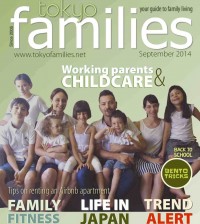- Belgium comes to Yamashita Park
- Residential Villa in Phuket Entices Remote Workers With Long-Stay Rates
- Rare pieces of French glass art at the Mirai Museum of Art
- Feast on fresh fish and seafood at the 2024 ‘Sakana’ Festival
- Would you like to ride in a Louis Vuitton gondola lift?
- Naked Snow Aquarium
- Festive lights at Yomiuriland will get you feeling the holiday vibes
Mobile Families

“We are being transferred.” Or “We are moving to Japan.”
Do you remember when you first heard those words?
Whether you just arrived in Japan on your first overseas assignment or you have been living here for some time; whether you are on your second or even third assignment; you may still vividly recall the first time you talked with your family about moving to Japan.
Internationally mobile families share some unique dynamics that become part of their family fabric while living overseas: Separation from family, friends, and extended community being only some of them. Another feature experienced by family members is the separation they experience from each other while living in Japan. Travel demands on expatriate employees typically are high; and required business entertainment in the evening may regularly take the expatriate worker away from the family. Often, this may result in the other parent effectively becoming a “single parent” during the overseas assignment, likely increasing her/his sense of isolation.
In addition, expatriate communities around the world are notoriously mobile: Expatriate families arrive and depart on a continual basis, with change being a frequent experience for all family members. Helping children adjust to living this “nomadic” and sometimes unpredictable life requires some planning and active parenting.
The concerns your children will have will depend on their age. In general, young children will miss family, friends, and familiar places. Older children, in addition, will be concerned on how their daily routines will be affected, and teenagers will also worry about “fitting in” and their social life in their new surroundings.
Concerns of children will also be influenced by personality. While an eight-year-old girl might quickly adjust to this new life, it might take a long time for her nine-year-old brother until he finally connects with the new place, considering it as his new home, and making friends, instead of just acquaintances.
Here are some suggestions you could consider to actively support your children in adjusting to this mobile life.
Since the international family experience is fraught with change, family routines and family rituals can provide a measure of continuity and stability, and these routines can serve as an important strategy to help children.
Keep consistent your family routines of meals, household responsibilities, bedtimes, and celebrations. Don’t relax household rules just because you moved. Do relax them temporarily, only if doing so can ease a particular aspect of your family’s adjustment.
Discuss in advance how the missing parent will stay in touch with the children during travel time and also on how to make joint parenting decisions. Establish ways to make up for missed anniversaries, birthdays, and other special events. Gather information about the kinds of activities you will find in Japan that match your children’s interests.
If your child is receiving an education not in his / her native language, try to look for clubs and activities outside of the school environment that allow for connection with your home culture.
If possible, having a home base or a place where the family can return to on a regular basis during vacation times is desirable. Maybe you had to sell your house as a result of the international move, so perhaps a grandparent’s or aunt’s home might act as a place to link with the family back home.
It is important to devote time for saying “good-bye” to friends who are moving to their next assignment or returning back to their home country. While friends may plan on staying in touch using e-mail and other modern technologies, it is the relationships that change with distance. Making the closure process a conscious one, giving time to it, is important to all children.
Creating “good-bye rituals” could be helpful, such as going to favorite places and doing favorite things together for the last time. Help everybody say goodbye to everyone they care about.
Have regular family discussions in which everybody gets to talk about the move and their new life, what they like and what they’re anxious about. Get everybody’s issues out on the table.
International families and children also experience enormous growth as a result of the mobile life: Exposure to new cultures, learning new languages and a richer set of experiences that will be treasured in the future. When looking back at their many trips and adventures, families will be proud of the vast richness of experience that these travels have provided.
As Mark Twain wrote: “Twenty years from now, you will be more disappointed by the things you didn’t do than by the ones you did do. So throw off the bowlines, sail away from the safe harbor. Catch the trade winds in your sails. Explore. Dream. Discover.”
Silke Conrad is a certified social worker with over twenty years of experience as a family therapist. She works with children and their families, helping them with child/parent problems, school difficulties and loss and grief issues. She has a particular interest in providing clinical consultations services on cross cultural issues. Silke lives with her husband and two children in Tokyo and works at TELL.











